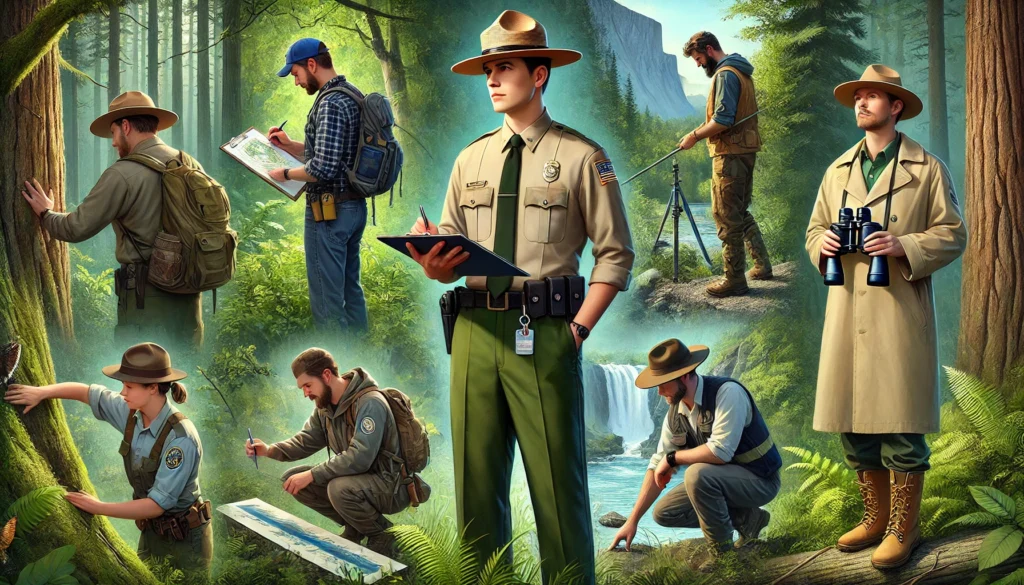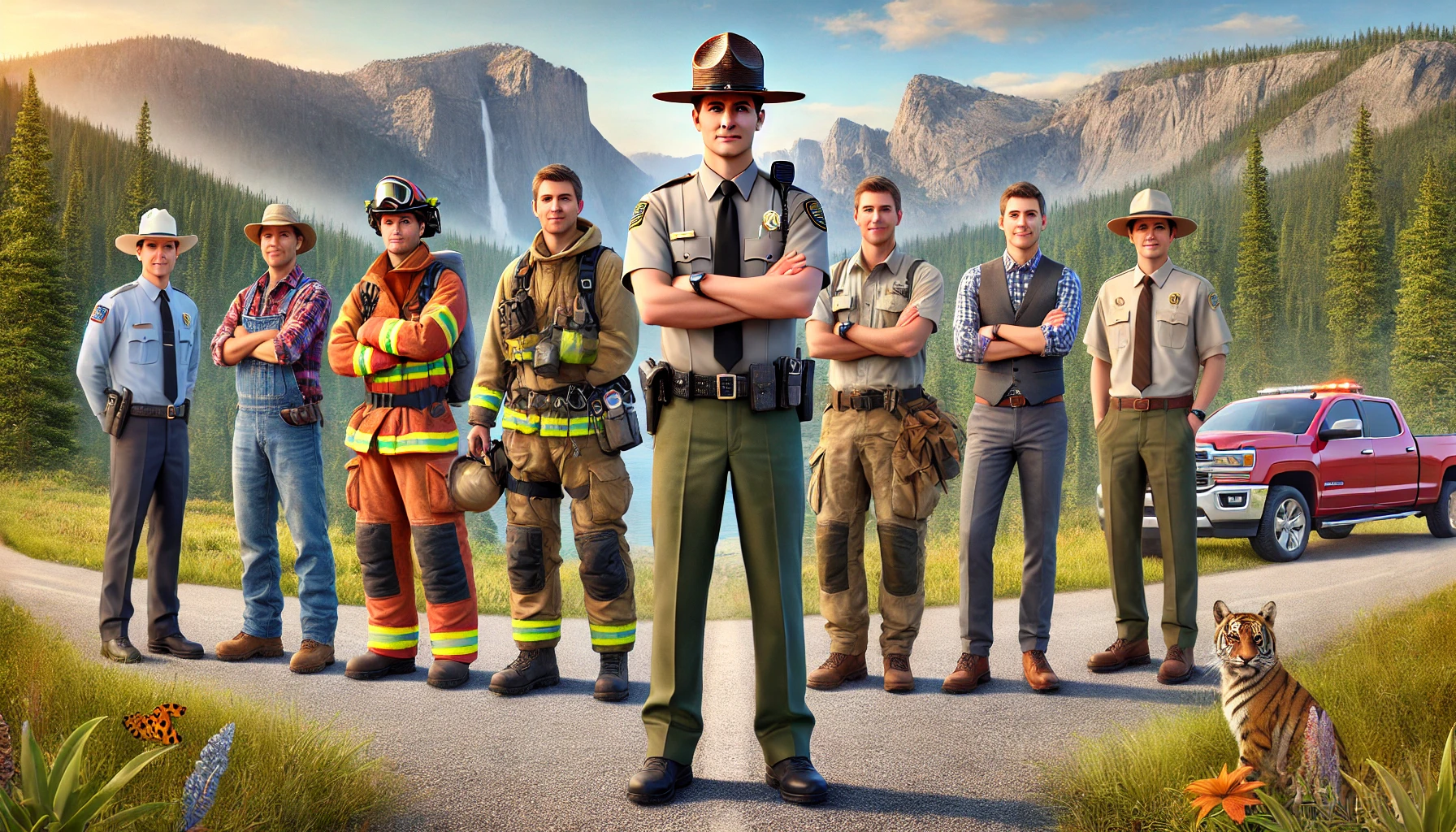Park Ranger vs 5 Similar Outdoor Careers: Which Pays Better?
Table of Contents
Introduction
Are you dreaming of turning your passion for the great outdoors into a rewarding career? As someone who’s spent over a decade helping outdoor enthusiasts navigate their career paths, I’ve noticed a common question: How does a Park Ranger’s salary compare to other nature-focused positions? In this comprehensive guide, we’ll explore six outdoor careers, with detailed salary comparisons, job requirements, and growth prospects. Whether you’re considering becoming a Park Ranger or exploring similar outdoor professions, this analysis will help you make an informed decision about your future.
Understanding the Park Ranger’s Role
Being a Park Ranger is more than just a job – it’s a calling that combines conservation, education, and public service. Park Rangers are guardians of our national parks, state parks, and protected areas. According to the National Park Service (NPS), these dedicated professionals earn between $35,000 and $ 84,00 annually, depending on their experience and location.
Link to National Park Service Careers
Key Responsibilities of a Park Ranger:
- Protecting and preserving natural resources
- Enforcing park rules and regulations
- Conducting educational programs
- Assisting visitors and ensuring their safety
- Maintaining park facilities
- Participating in search and rescue operations
Comparative Analysis: Park Ranger vs Similar Careers

1. Wildlife Biologist
While Park Rangers focus on park management and visitor services, Wildlife Biologists specialize in studying animal behavior and ecosystems. According to the Bureau of Labor Statistics, Wildlife Biologists earn a median salary of $66,350, slightly higher than the average Ranger salary.
Link to Bureau of Labor Statistics – Wildlife Biologists
Key differences from the Park Ranger role:
- More research-focused
- Requires advanced degrees
- Less public interaction
- Higher emphasis on scientific study
- Better grant funding opportunities
2. Environmental Scientist
Environmental Scientists typically earn more than Park Rangers, with a median salary of $76,530. These professionals focus on environmental problems and solutions, often working with government agencies or consulting firms.
Advantages of Park position:
- Higher salary potential
- More diverse work environments
- Greater opportunity for private sector work
- Advanced research opportunities
- Better urban job prospects
3. Forest and Conservation Technician
These professionals work alongside Park Rangers but focus more on the technical aspects of forest management. The median salary ranges from $38,940 to $53,700, comparable to entry-level Ranger positions.
Link to Forest Service Careers
Comparison with Park Ranger duties:
- More hands-on conservation work
- Less law enforcement responsibility
- Similar educational requirements
- Comparable benefits package
- Greater focus on forest management
4. Conservation Officer
Conservation Officers, also known as Game Wardens, typically earn more than Park Rangers, with salaries ranging from $45,000 to $90,000. These professionals focus more on law enforcement aspects of natural resource protection.
Link to Association of Fish and Wildlife Agencies
Differences from Park Rangers
role:
- Stronger emphasis on law enforcement
- Higher starting salary
- More specialized training required
- Greater authority range
- Different jurisdiction areas
5. Outdoor Recreation Planner
These professionals earn between $45,000 and $85,000, similar to Park Rangers but with different focus areas. They plan and manage recreational activities and facilities in natural areas.
Comparative advantages:
- More administrative roles available
- Better urban job opportunities
- Similar salary range to Park Rangers
- Less physical demands
- More planning-focused work
Salary Analysis and Benefits Comparison
Park Ranger Salary Breakdown
The Park Rangers salary structure varies significantly based on:
- Federal vs. State Employment
- Geographic location
- Experience level
- Special certifications
- Seasonal vs. permanent positions
Benefits Comparison Across Outdoor Careers
Federal Benefits (Including Park Rangers):
- Federal Employee Health Benefits (FEHB)
- Federal Employee Group Life Insurance (FEGLI)
- Thrift Savings Plan (TSP)
- Federal pension program
- Paid vacation and sick leave
- Professional development opportunities
State and Private Sector Benefits:
- State retirement systems
- Health insurance options
- Varied vacation policies
- Different professional development opportunities
- Location-specific benefits
Education and Training Requirements
Park Ranger Requirements
To become a Park Ranger, you typically need:
- Bachelor’s degree in a relevant field
- Seasonal experience
- Physical fitness requirements
- Law enforcement training (for some positions)
- First aid and CPR certification
Comparative Education Requirements
- Wildlife Biologist:
- Master’s degree is often required
- Research experience
- Specialized study areas
- Publication history helpful
- Field experience
- Environmental Scientist:
- Bachelor’s degree minimum
- Master’s preferred for advancement
- Laboratory experience
- Research Methodology
- Data analysis skills
- Forest and Conservation Technician:
- Associate’s degree minimum
- Technical certifications
- Hands-on experience
- Equipment operation skills
- Safety training
- Conservation Officer:
- Bachelor’s degree
- Law enforcement academy
- Weapons training
- Legal knowledge
- Physical fitness requirements
- Outdoor Recreation Planner:
- Bachelor’s degree
- Planning experience
- Project management skills
- Public relations abilities
- Administrative capabilities
Job Market Analysis and Growth Prospects
Park Ranger Job Market
The Park Ranger job market shows steady growth, with the National Park Service reporting:
- 2-4% annual growth rate
- Increased demand in popular parks
- Seasonal opportunities expanding
- Specialized position growth
- Remote location opportunities
Link to USA Jobs – Park Ranger Positions
Comparative Job Market Analysis
Growth Rates (2021-2031):
- Wildlife Biologists: 5%
- Environmental Scientists: 8%
- Forest Technicians: 3%
- Conservation Officers: 4%
- Outdoor Recreation Planners: 6%
Work Environment Comparison
Ranger Work Environment
Park Rangers typically work in:
- National parks
- State parks
- Historic sites
- Recreation areas
- Visitor centers
Alternative Career Environments
- Wildlife Biologist:
- Research laboratories
- Field stations
- Universities
- Government agencies
- Private organizations
- Environmental Scientist:
- Government offices
- Consulting firms
- Research facilities
- Industrial sites
- Educational institutions
- Forest Technician:
- National forests
- State forests
- Private timber companies
- Conservation areas
- Research stations
- Conservation Officer:
- State wildlife areas
- Marine environments
- Rural areas
- Urban parks
- Waterways
- Outdoor Recreation Planner:
- Government offices
- Parks and Recreation departments
- Private recreation companies
- Tourism agencies
- Conservation organizations
Career Advancement Opportunities
Park Ranger Career Path
Park Rangers can advance through:
- Supervisory positions
- Specialized roles
- Regional management
- Training positions
- Program coordination
Comparative Career Advancement
Each career offers unique advancement opportunities:
- Wildlife Biologist:
- Research director
- Project manager
- Policy advisor
- Conservation director
- Academic positions
- Environmental Scientist:
- Senior Scientist
- Program Manager
- Department head
- Consulting Partner
- Research director
- Forest Technician:
- Crew leader
- Operations Manager
- Resource Specialist
- Program Coordinator
- Technical supervisor
- Conservation Officer:
- Chief officer
- Regional supervisor
- Training Coordinator
- Special operations
- Administrative roles
- Outdoor Recreation Planner:
- Department director
- Regional coordinator
- Program Manager
- Policy advisor
- Facility manager
Making Your Career Choice
Factors to Consider
When choosing between a Ranger career and similar positions, consider:
- Salary expectations
- Work-life balance
- Location preferences
- Physical Demands
- Career growth potential
Decision-Making Framework
- Assess your interests and skills
- Research job availability
- Consider educational requirements
- Evaluate salary needs
- Factor in lifestyle preferences
Conclusion
While the Ranger position offers a unique blend of conservation work, public service, and outdoor engagement, similar careers may provide higher salaries or different focuses. The choice between these careers should depend on your personal goals, desired work environment, and salary requirements.
Each role contributes significantly to environmental conservation and outdoor recreation, with Rangers serving as the visible face of our national parks system. Whether you choose to become a Ranger or pursue one of the alternative careers, you’ll be part of a vital workforce protecting and preserving our natural resources for future generations.
Next Steps
- Research specific positions in your area
- Contact current professionals in your chosen field
- Review educational requirements
- Begin networking within your chosen industry
- Gain relevant volunteer or seasonal experience
Link to National Park Service Volunteer Opportunities
Remember, the best career choice aligns with both your personal interests and professional goals. Whether you choose to become a Ranger or pursue one of the alternative outdoor careers, your work will contribute to the preservation and enjoyment of our natural resources.







